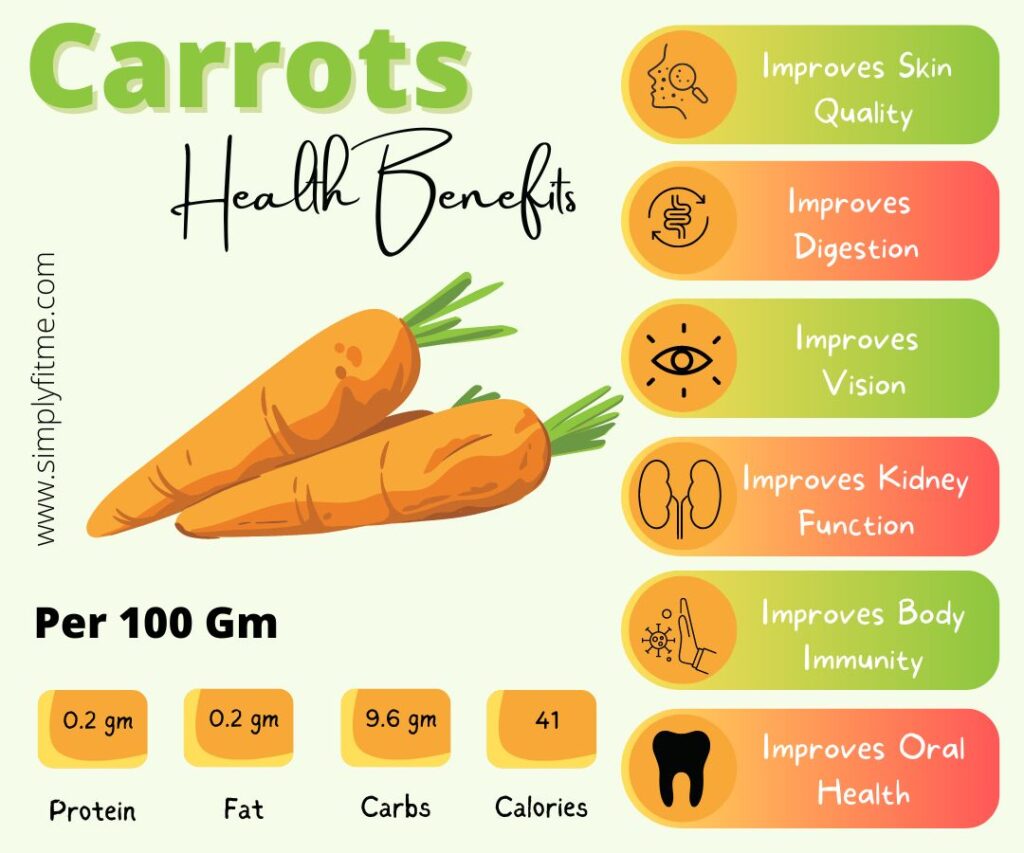Nutritional Overview of Carrots
8 Benefits of Carrots, According To a Dietitian – Carrots, a versatile and widely accessible vegetable, are a nutritional powerhouse. They are an excellent source of essential vitamins, minerals, and antioxidants, making them a valuable addition to a healthy diet. This overview delves into the nutritional composition of carrots, providing a detailed analysis of their nutrient content.
The table below provides a comprehensive breakdown of the nutrient content of carrots per 100 grams (g), along with the percentage of daily recommended intake (%DRI) that they provide:
| Nutrient |
Amount per 100g |
%DRI |
| Calories |
41 |
2% |
| Carbohydrates |
9.58g |
3% |
| Protein |
0.93g |
2% |
| Fat |
0.24g |
0% |
| Fiber |
2.8g |
11% |
| Vitamin A (as beta-carotene) |
16,200 IU |
324% |
| Vitamin C |
5.9mg |
7% |
| Vitamin K1 |
12.2mcg |
15% |
| Potassium |
208mg |
4% |
| Manganese |
0.14mg |
7% |
Cardiovascular Benefits

Carrots, rich in carotenoids and dietary fiber, play a significant role in promoting heart health.Research has demonstrated a positive correlation between carrot consumption and reduced risk of cardiovascular diseases. Carotenoids, particularly beta-carotene, possess antioxidant properties that combat oxidative stress, protecting the heart from damage.
Cholesterol Management
Carrots contain soluble fiber, which binds to cholesterol in the digestive tract and prevents its absorption into the bloodstream. By lowering LDL (bad) cholesterol levels, carrots help maintain healthy cholesterol profiles.
Blood Pressure Regulation
Carrots are a good source of potassium, a mineral that helps regulate blood pressure. Potassium counteracts the effects of sodium, which can elevate blood pressure. Additionally, the dietary fiber in carrots contributes to satiety, promoting weight management and reducing the risk of hypertension.Studies have shown that individuals who consume carrots regularly have a lower risk of developing heart disease, stroke, and other cardiovascular complications.
The combination of cholesterol-lowering, blood pressure-regulating, and antioxidant properties makes carrots a valuable dietary component for heart health.
Eye Health and Vision
Carrots are widely recognized for their exceptional benefits in maintaining eye health. They contain a wealth of nutrients, including beta-carotene, an antioxidant that plays a crucial role in protecting and supporting the eyes.
Beta-carotene is converted into vitamin A in the body, which is essential for the production of rhodopsin, a protein that aids in low-light vision. Adequate intake of vitamin A helps prevent night blindness and improves overall vision, especially in dim or low-light conditions.
Macular Degeneration Prevention
Furthermore, beta-carotene acts as a powerful antioxidant, shielding the eyes from oxidative damage caused by free radicals. This damage is a significant factor in the development of age-related macular degeneration (AMD), a leading cause of vision loss in older adults.
Studies have demonstrated that regular consumption of carrots can reduce the risk of AMD by up to 25%.
For instance, the Age-Related Eye Disease Study (AREDS) found that individuals who consumed a daily supplement containing beta-carotene, vitamin C, and vitamin E experienced a significant reduction in the progression of AMD.
Immune System Support

Carrots are renowned for their immune-boosting properties, primarily due to their rich content of antioxidants and vitamins. Beta-carotene, a precursor to vitamin A, is a powerful antioxidant that helps protect cells from damage caused by free radicals. Vitamin C, another potent antioxidant, further strengthens the immune system by stimulating the production of white blood cells, which are essential for fighting infections.
Carrot Consumption and Infection Prevention, 8 Benefits of Carrots, According To a Dietitian
Regular consumption of carrots has been linked to a reduced risk of developing infections. Studies have shown that individuals who consume higher amounts of carrots have stronger immune responses and are less likely to experience colds, flu, and other common infections.For instance, a study published in the journal “Nutrition and Cancer” found that people who ate carrots regularly had a 23% lower risk of developing upper respiratory tract infections compared to those who did not consume carrots.
Digestive Health
Carrots are an excellent source of dietary fiber, which plays a vital role in maintaining a healthy digestive system. Fiber is essential for promoting regular bowel movements and preventing constipation. It adds bulk to the stool, making it easier to pass and reducing the risk of painful and uncomfortable constipation.
Fiber Content
Carrots contain both soluble and insoluble fiber. Soluble fiber dissolves in water and forms a gel-like substance in the digestive tract. This gel helps slow down digestion and absorption of nutrients, promoting satiety and regulating blood sugar levels. Insoluble fiber, on the other hand, does not dissolve in water and adds bulk to the stool, aiding in its smooth passage through the intestines.
Digestive Benefits
The high fiber content in carrots provides several digestive benefits:
Promotes Regularity
The fiber in carrots helps stimulate peristalsis, the involuntary muscle contractions that move food through the digestive tract. This promotes regular bowel movements and reduces the risk of constipation.
Prevents Hemorrhoids
Constipation can lead to the development of hemorrhoids, painful swellings in the anal region. By promoting regularity, carrots can help prevent the formation of hemorrhoids.
Supports Gut Health
The fiber in carrots feeds the beneficial bacteria in the gut, promoting a healthy gut microbiome. A healthy gut microbiome is essential for proper digestion, nutrient absorption, and overall well-being.
Skin Health and Appearance
Carrots are rich in antioxidants, particularly beta-carotene, which is converted to vitamin A in the body. Vitamin A is essential for maintaining healthy skin. It helps to protect the skin from damage caused by free radicals, which are unstable molecules that can damage cells and contribute to aging.Vitamin A also plays a role in the production of collagen, a protein that gives skin its elasticity and strength.
As we age, our collagen production decreases, which can lead to wrinkles and sagging skin. Eating carrots can help to slow down this process and maintain skin elasticity.In addition to vitamin A, carrots also contain other nutrients that are beneficial for skin health, such as vitamin C, potassium, and fiber.
Vitamin C is another antioxidant that helps to protect the skin from damage, while potassium helps to keep the skin hydrated. Fiber helps to promote a healthy digestive system, which can also have a positive impact on skin health.There is some anecdotal evidence to suggest that carrots can be used topically to improve skin health.
For example, some people believe that applying carrot juice to the skin can help to reduce wrinkles and improve complexion. However, there is no scientific evidence to support these claims.
Bone Health: 8 Benefits Of Carrots, According To A Dietitian
Carrots play a vital role in supporting bone health by providing essential vitamins and minerals necessary for bone growth and strength. These nutrients contribute to the formation and maintenance of strong, healthy bones, reducing the risk of developing osteoporosis and other bone-related conditions.
Vitamin K
Vitamin K, found in abundance in carrots, is crucial for bone health. It plays a key role in the formation of osteocalcin, a protein that helps bind calcium to bones, promoting bone mineralization and strength. Adequate vitamin K intake has been associated with improved bone density and a reduced risk of fractures.
Beta-Carotene
Beta-carotene, a precursor to vitamin A, is another important nutrient found in carrots. It acts as an antioxidant, protecting bone cells from oxidative damage and inflammation. Studies have shown that higher intakes of beta-carotene are linked to better bone health and a lower risk of osteoporosis.
Potassium
Potassium is an essential mineral that contributes to bone health. It helps regulate calcium levels in the body and supports the formation of new bone tissue. A diet rich in potassium has been associated with increased bone mineral density and reduced bone loss.
Other Nutrients
In addition to these key nutrients, carrots also provide other vitamins and minerals that support bone health, including calcium, magnesium, and phosphorus. These nutrients work together to maintain bone structure, density, and overall health.
Cancer Prevention
Carrots are rich in antioxidants and phytonutrients, which may play a role in protecting against certain types of cancer. Beta-carotene, a carotenoid found in carrots, has been linked to a reduced risk of lung cancer.
Research Findings
- A study published in the American Journal of Clinical Nutrition found that individuals with higher intakes of beta-carotene had a lower risk of lung cancer.
- Another study, published in the Journal of the National Cancer Institute, suggested that a diet rich in carotenoids, including beta-carotene, may be associated with a reduced risk of prostate cancer.




